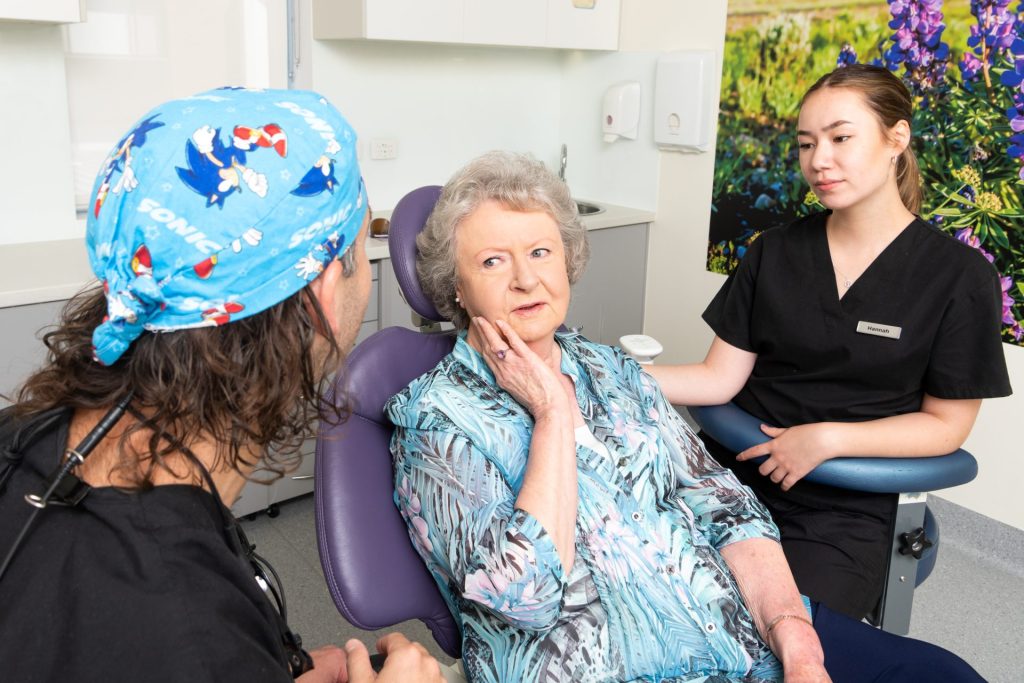
Alleviate your headaches from jaw clenching
You might not realise it, but you may clench your jaw while you’re sleeping or even subconsciously when you’re awake. This clenching can lead to several implications, such as chipped teeth, worn teeth, chronic jaw pain and headaches. We use our jaws every day for speaking and eating. These constant stresses on your jaw joint can lead to nasty headaches, but fortunately, our expert dental team at The Village Dentist, your Castle Hill dental clinic. has the right tools and resources to ease your symptoms.
If you experience jaw joint pain and general discomfort from your jaw muscles, it’s a great idea to visit our practice. If you regularly clench your jaw, you might be subject to teeth grinding without knowing. We have some neat devices that can help reduce the damage caused by teeth grinding.
TMJ disorder and Bruxism
There are typically two ailments associated with jaw clenching, which you can explore below:
Bruxism
Bruxism is often the most common cause of joint pain in your jaw and facial muscles. There are several reasons you might experience Bruxism, such as situational anxiety, intense concentration and even vitamin deficiencies. You might also experience nocturnal Bruxism, which is a sleep-related jaw movement disorder. Nocturnal Bruxism might be hard to identify, as you’re not exactly aware of your jaw clenching while sleeping. Relative to other jaw disorders, Bruxism is treatable, but if left unchecked, it can develop into more serious jaw issues.
Temporomandibular joint disorder
Temporomandibular joint disorder (TMJ) is a bit more of a serious disorder affecting your jaw muscles. The TMJ joint connects your jaw to your skull. TMJ disorders affect this joint, often resulting in jaw clicking, teeth grinding, jaw clenching and chronic facial pain. If individuals have severe Bruxism, it might actually develop into a TMJ dysfunction. The treatments for TMJ pain share several Bruxism treatments, though in severe cases, patients may require surgery to ease their symptoms of TMJ.
How do I know if I have Bruxism or TMJ?
If you’re experiencing Bruxism or TMJ, it’s important to book in for an appointment for a treatment plan to minimise the damage caused by teeth grinding. It can be important to know the symptoms of TMJ and Bruxism. They both share common symptoms, which you can find below:
- jaw pain
- neck pain
- headaches
- jaw stiffness
- facial pain
- worn and chipped teeth
- sensitive teeth
What causes jaw clenching?
There are many reasons you might clench your jaw. It may result from situational anxiety, stress, intense concentration and many other factors. Understanding the causes of jaw clenching might help you identify if you have Bruxism or TMJ disorder. Bruxism and TMJ disorder commonly occur from:
- dehydration
- vitamin and mineral deficiency
- excessive consumption of alcohol
- consumption of tobacco products
- several illnesses and disorders, like ADHD and sleep apnoea
- intense concentration
- situational anxiety
- consistent stress
- medications and stimulants
Treatment for TMJ and Bruxism
Depending on the reasons for your Bruxism or TMJ disorder, your symptoms might ease themselves. For example, if you can manage your stress and anxiety, you might stop clenching your jaw. Jaw clenching from other causes, though, such as sleep apnoea and ADHD, might require medical attention or help from devices. The first step you should take for receiving treatment is to visit our professional dental team at The Village Dentist. Our dentists can assess the extent of your Bruxism or TMJ disorder, allowing them to identify an effective treatment plan. Below, you can explore two common treatments for your jaw clenching:
Occlusal splint
An occlusal splint, also known as a night guard or bite guard, is a custom-fitted dental appliance you insert into your mouth while sleeping. If you visit our dental practice in Castle Hill, our dentists can create a custom night guard specific to your mouth, making your sleeping experience as comfortable as possible. The night guard doesn’t exactly stop jaw clenching, but it can minimise the damage from teeth grinding, which is a common symptom of both Bruxism and TMJ disorders.
Muscle relaxation techniques and medication
If the night guard doesn’t ease your symptoms and your jaw muscles are causing chronic pain, our highly experienced dentist, Dr Tirza Harley, can administer muscle relaxant injectables to alleviate your jaw muscle tension for up to six months. Dr Tirza Harley has successfully treated many patients and helped them manage their Bruxism and TMJ disorders. You might also benefit from over-the-counter muscle relaxation medication to ease your jaw stiffness and prevent clenching.
